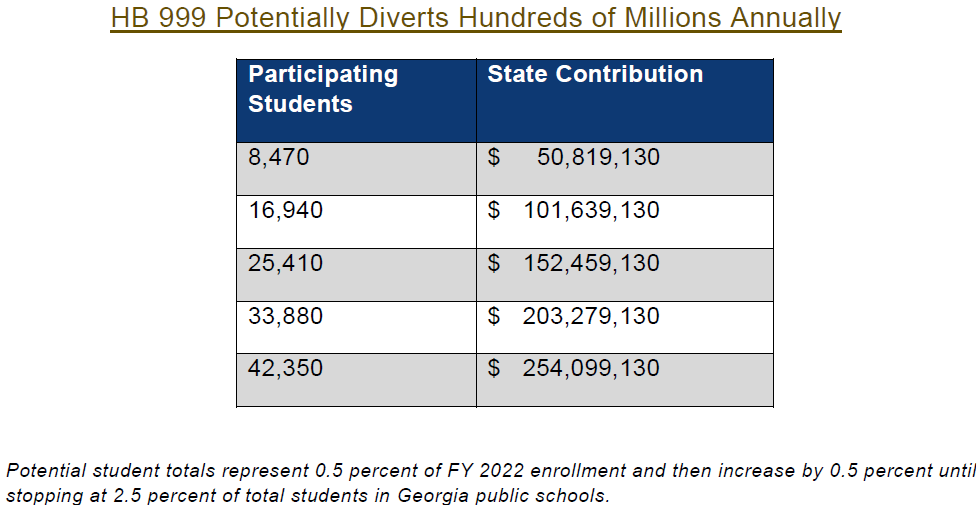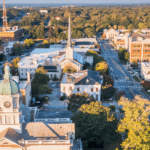Key Takeaways
- House Bill 999 relies on a faulty measure to calculate the state’s allocations to public schools
- Georgia cannot afford to ignore the needs inside public schools in favor of exclusionary private schools
- State lawmakers concerned about Georgia’s children should reject HB 999 and consider legislation like HB 10 which provided additional funding for students who need it most
Bill Summary
The Georgia House Education Subcommittee on Academic Innovation recently voted do pass on a bill that would funnel public state dollars to private schools. House Bill 999 would create an education savings account (ESA), another name for a voucher for families to pay for private school tuition or qualified education expenses with funds from the state government. The bill would set aside $6,000 per academic year into a “consumer-directed account,” and a family’s acceptance would act as a refusal of federal protections for students with disabilities and state laws for an adequate public education such as background checks for teachers.[1]
Private schools that receive these funds would not have to be fully accredited and teachers in these schools would not have to have a bachelor’s degree, key safeguards that have been put in place to assure a level of quality in education. Participating children’s guardians may also use the ESA for other qualified education expenses like private transportation or tutoring services. Contested expenses would be reviewed by a panel of parents whose children are currently receiving this ESA instead of a neutral party, raising concerns for conflicts of interest. The entire program would be run out of the Georgia Student Finance Commission.
Cost
HB 999 is subject to appropriation, which means the cost would be determined annually by the General Assembly. The bill has language to decide how to fund the ESAs in the event that there are more applicants than can be funded at the $6,000 per year amount. HB 999 allows the Georgia Student Finance Commission to use three percent of the funds to administer the program. The table below shows potential costs depending on the number of students the state legislature would like to participate in the program and assuming similar demand.

HB 999 Miscalculates Student Allocation to Prioritize Private Education
In Fiscal Year (FY) 2022 the state sent $9.9 billion to local districts and charter schools to educate 1.7 million full-time equivalent students at a per-pupil cost of $5,751. This amount is an average that is heavily weighted by students that command higher-cost programs due to stated needs, such as students with disabilities or English-Language Learners. While the average per-pupil spending was $5,751, students in general education 9th-12th grade classes were only allotted $4,159—a difference of $1,592 per child, and a full $1,800 less than the amount provided in the voucher.[2] This difference in allotments appears to prioritize private education expenses over the schools and students (such as those in high school general education courses) that the state is constitutionally required to support.
Policy Considerations
Georgia has made budget cuts to public schools in 18 of the last 20 years, totaling $10 billion of underfunding.[3] Although the governor’s budget would restore the cut from the current year, the state’s record has left a hard legacy for children via larger class sizes, an aging school bus fleet and other consequences. Public schools are operating during a pandemic that has also taken a terrible toll. When children are struggling with waning mental health, the state has been unable to fund even one counselor for every 450 students. For reference, the American School Counselors Association recommends a school counselor ratio of 1:250.[4]
When children are struggling with waning mental health, the state has been unable to fund even one counselor for every 450 students.
The state has similarly underfunded necessary grants for student transportation, teacher substitutes and rural education.[5] Georgia remains one of only six states in the nation that does not provide additional funding to educate students living in poverty.[6] With so many holes in the way the state provides for education, it is irresponsible to fund a separate, private, education system. State lawmakers who are concerned about the quality of education should reject policies like vouchers and instead invest in communities that have been hit the hardest by COVID-19. Legislation like House Bill 10, which provides additional funding for students living in poverty, would offer new opportunities for every school in Georgia instead of singling out just the families who could use a voucher.[7]
Endnotes
[1] House Bill 999. LC 49 0739. https://www.legis.ga.gov/legislation/61329
[2] Based on a GBPI analysis of Georgia Department of Education. Quality Basic Education Act Allotment Sheet. Earnings Sheet for FY 2022.
[3] Owens, S. (2022). State of education funding (2022). Georgia Budget and Policy Institute. https://gbpi.org/state-of-education-funding-2022/
[4] American School Counselor Association. School counselor roles & ratios. https://www.schoolcounselor.org/About-School-Counseling/School-Counselor-Roles-Ratios
[5] Owens, S. (2022). State of education funding (2022). Georgia Budget and Policy Institute. https://gbpi.org/state-of-education-funding-2022/
[6] Owens, S. (2022). Overview: 2023 Fiscal Year budget for K-12 education. Georgia Budget and Policy Institute. https://gbpi.org/overview-2023-fiscal-year-budget-for-k-12-education/
[7] House Bill 10. LC 49 0262. https://www.legis.ga.gov/legislation/58795









